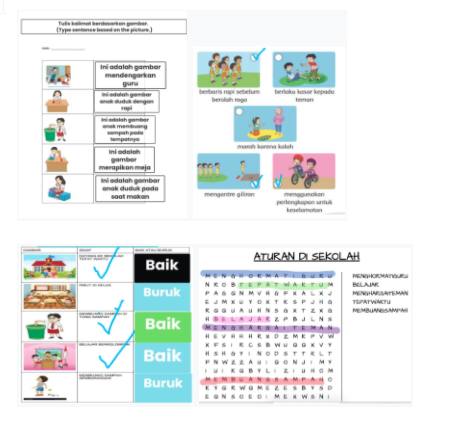Primary eNews – December 11, 2020
Grade K/1 Indonesian Studies – Wayang
Grade K/1 students have been learning about one of the Indonesian cultures, namely, Wayang (Indonesian puppets). At the beginning of the lesson, they learned how Wayang is used to tell stories.
The students also learned the types of puppets in Indonesia such as Wayang Beber, Wayang Kulit, Wayang Golek, Wayang Klitik, and Wayang Wong. They gave their opinions about their favorite Wayang including the reasons.
In the next lesson, the students watched the video about how to make Wayang Kulit and Wayang Golek. They showed good enthusiasm when watching videos about puppetry. They also tried to make their own Wayang from paper. Here are some examples of students’ work.

Grade 2 Civics – Aturan Sekolah (Rules at school)
In the Civics lesson, grade 2 students learned about school rules. At the beginning of the lesson, they watched a video about school rules. After that, they mentioned the examples of school rules that were on the video and the school rules in BIS. Students seemed very excited in citing the examples of school rules.
In the next learning activity, the students worked on tasks that related to school rules such as pairing pictures with words, labeling pictures, and identifying the examples of good attitude at school. They also played word search games related to school rules. Students did the assignments very well. Here are some examples of student’s work.

Counseling
The end of Semester 1 is a natural time for transitions to happen at international schools. Whether your child is leaving, staying, or arriving, it is helpful to recognize that this time of year brings a change in friendship and peer groups, impacting all in the community.
Moving or arriving after a move
Early childhood aged children who move are uprooted from the safe space they spend most of their time, their home. Many experience the loss of a beloved caretaker. Primary children and teens are fully aware of leaving friends, teachers, school, a sense of what it means to be a BIS student, and Bali.
- Understand that children and teens rarely have any say in a family move.
- Try as best you can to give your children and teens some sense of control on the other side. Perhaps they pick their room, or you agree to let them decide how to decorate their space. Maybe your children can choose what family routines they liked, like “pizza night,” and one they would like to add relevance to the new place they live, like “exploring restaurants night,” and some to replace, like “beach night.”
- Help them learn and get excited about their new school and ask the counselor to help them connect with new students.
- Figure out ways to help them stay connected to close friends they leave behind.
- Support them with farewells and hellos.
- Make sure you listen to how they feel about leaving and arriving in a new place and understand that regression happens.
- Make sure the school knows your family is leaving. Schools want to help with the transition.
Staying
Children and teens, who stay in one international school for an extended time, experience repeated losses of peers and friends.
- Ask your child if they know of anyone moving from their class or friend group.
- Find out how they are feeling and processing that loss.
- Try to help them find power because they do not have control of this situation.
- Agree to ways they can say farewell in a caring manner and stay connected to close friends who are leaving.
- Be careful that your child or teen is not talking about how it’s easier not to connect with new people because it hurts too much when people leave. Even adults staying in transient communities start to do this. Be careful you are not modeling this approach.
Children and teens from international schools build resilience, but that does not mean that they naturally know how to stay, leave, and arrive well. Be patient and take time to work through transitions together. Lastly, all family members tend to do as well as the parent struggling the most after a move. Look after yourself and other adults in the community.
Scholastic Book Ordering Available; Deadline Friday, October 18th
This is an informational message about ordering books for your child through Scholastic. I have attached a short video where I walk through the steps and explain the important details as well. I have also posted an announcement on SeeSaw with details as well (and have explained it to students in their library classes. If interested (and I hope you are), please take a look and/or speak with your child.
I have also included a detailed, instructional letter as well as a catalog of book offerings (that gives the price in IDR). Your child will be receiving a color catalog and these documents in paper form starting today. Ask them for these documents when they return home.
Please watch the video and read the directions letter for all the necessary information.
This is of course optional, but if you would like to order books for your child, the deadline is Friday, December 18th. I know this is soon (and the last day of the term for BIS students) but we only just received the catalogs and Scholastic’s deadline is January 5, 2021, which occurs while we are on break. Thus, we need to get everything squared away before we break for the year.
Please return the “Scholastic Price List November in IDR” form (your child will also be receiving a paper copy in addition to the attachment to this email) correctly filled out WITH the exact amount of rupiah in cash (as well as their name and teacher’s name) and return this to your child’s homeroom teacher on or before Friday, December 18th. Orders not received by the 18th will not be included in this year’s order.
For any further clarification, please email Mr. Marshall at nmarshall@baliis.net


